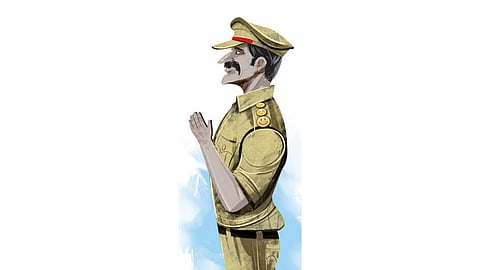

KOCHI: Despite the increasing recognition of the Kerala Police as a disciplined, skilled, and highly educated force, the reality for lower-ranked cops, particularly civil police officers (CPOs), remains starkly different.
The majority of officers who began their career as a CPO-level officer--under the eligibility norms of 18-25 years of age and minimum higher secondary qualification--receive only one or two promotions in their entire career, and are forced to continue without hope of advancing to higher positions.
To address this deflating situation and infuse greater dynamism into the force, the Kerala Police Officers Association (KPOA) has submitted a proposal to the state government recommending key reforms.
They include revising the eligibility criteria for CPO recruitment to include only candidates aged 21-28 with at least a degree, discontinuing the current practice of directly recruiting sub-inspectors from the general public through the Public Service Commission (PSC), and retaining the system in which 50% of posts for senior CPO (SCPO), assistant sub-inspector (ASI), and sub-inspector (SI) are filled through internal promotions.
“Those of us recruited from the 1993 CPO rank list are now considered senior officers. Most of my batchmates have already retired, and many others are nearing retirement. Apart from a single promotion and a few grade-based advancements, most of us have remained in the same sanctioned post throughout our careers. It’s mentally and physically disheartening to serve for decades in a role with no real opportunity for growth,” said a senior CPO with Ernakulam Rural police, who requested anonymity.
“Even the limited grade-level promotions are effected after years of struggle. Here, too, younger officers are often favoured,” he added.
Commenting on the new proposal, N V Nishad, ASI with Kochi City police, said, “Currently, the minimum educational requirement for a CPO is Plus Two. In the last 25 years, most of the candidates appearing for the CPO recruitment exam have been degree holders, while many have postgraduate and even PhD qualifications. In this context, the new proposal is a welcome move.”
Despite the educational qualification of CPOs, most of the officers end up retiring with just one official promotion. Even the grade-based promotions don’t reflect on official rank: They’re only visible on uniform, not on paper, Nishad explained.
He added that if the new proposal is implemented, CPO recruitment will be restricted to at least degree holders, and the current structure where 50% of posts for senior SCPOs, ASIs and SIs are filled through internal promotions will continue.
“Instead of direct recruitment of SIs from the general public, the PSC should conduct competitive exams exclusively for serving police personnel, with a syllabus focusing on relevant areas such as Indian law, policing duties, and criminal investigations. Physical fitness tests must also be held without compromise,” he said.
“This would create a level playing field for dedicated officers to rise through the ranks based on merit, skill, and knowledge,” said Nishad, who is also the Kochi City district secretary of KPOA.
C R Biju, state general secretary of KPOA, said that if the proposals are implemented the overall standard of the police force would significantly improve. “With this proposal, police personnel would be able to serve their average 37-year career with opportunities for multiple promotions and perform to their potential. Knowing they have a long professional journey ahead, officers would be more conscious of maintaining a clean service record. The emphasis on mandatory physical fitness would also encourage them to stay in top physical condition,” he said.
Even though officers like myself are nearing the end of our service, this proposal holds immense promise for the younger generation entering the force, Biju added.
Meanwhile, a CPO aspirant, who chose to remain anonymous, voiced concerns.
“Certain aspects of the proposal, especially the idea of promotions based on merit, are truly commendable. However, the real issue lies in accurately reporting vacancies and ensuring timely recruitment from the existing rank list. Without that, it’s like applying medicine on the skin without treating the wound beneath.”
He pointed out that the ego of some higher officers in the force may stand in the way of these proposals.